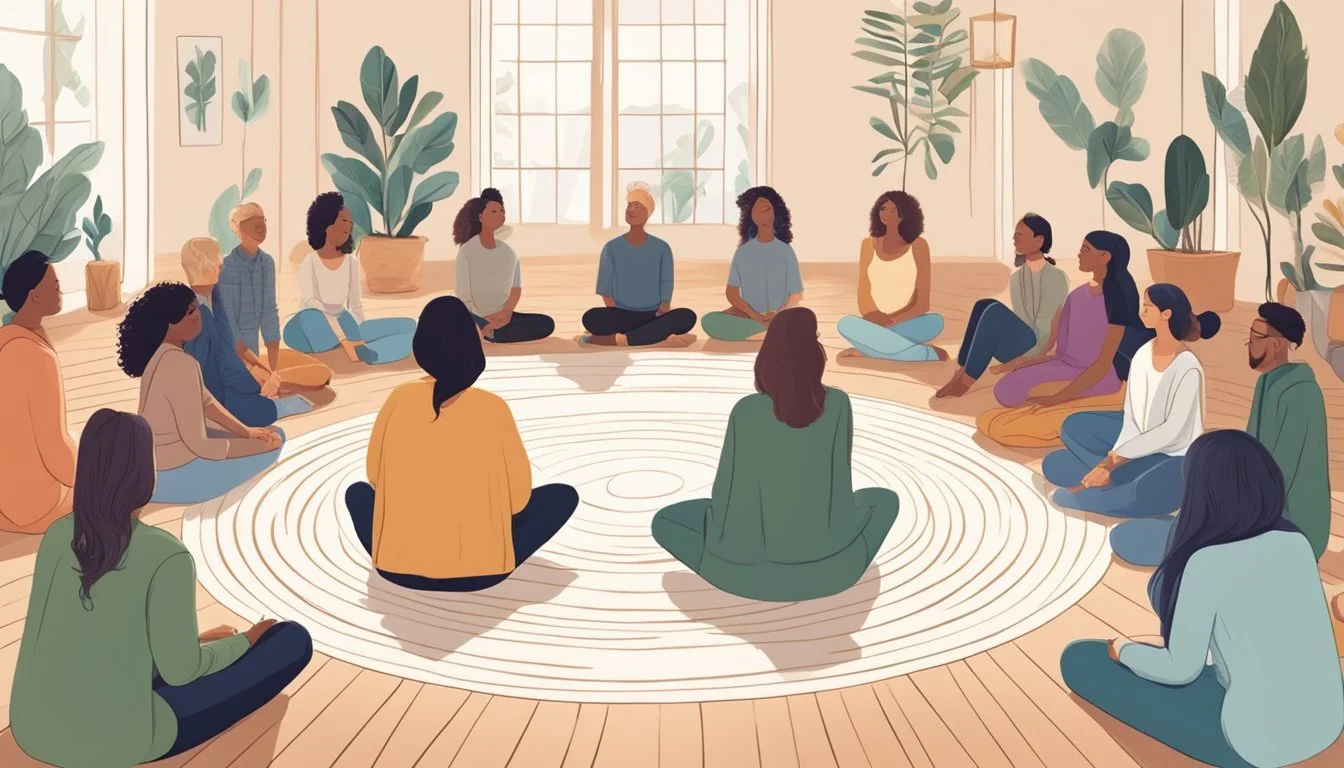8 Strategies for Empaths to Navigate Social Gatherings Without Overwhelm
Effective Techniques for Emotional Balance
Empaths possess the remarkable ability to sense and absorb the emotions of those around them. While this sensitivity can be a gift, it often presents challenges in social situations where numerous energies converge. Many empaths find themselves overwhelmed at gatherings, struggling to maintain their emotional equilibrium amidst the swirling emotions of others.
Fortunately, empaths can learn effective strategies to navigate social events with greater ease and comfort. By implementing specific techniques, they can protect their energy, set healthy boundaries, and fully engage in social interactions without becoming emotionally drained. These skills allow empaths to enjoy social gatherings while honoring their unique sensitivities and maintaining their well-being.
1) Practice Deep Breathing
Deep breathing is a powerful tool for empaths to manage overwhelming emotions during social gatherings. This technique helps calm the nervous system and reduce stress quickly.
When feeling overwhelmed, empaths can pause and take a few slow, deep breaths. Inhaling deeply through the nose and exhaling slowly through the mouth can create a sense of calm.
Focusing on the breath draws attention away from external stimuli and helps center the mind. This simple practice can be done discreetly, even in the midst of social interactions.
Empaths may find it helpful to practice deep breathing regularly before attending events. This builds familiarity with the technique, making it easier to use when needed.
Some empaths find it beneficial to pair deep breathing with visualization. Imagining exhaling negative energy and inhaling positive energy can enhance the calming effects.
Consistent use of deep breathing can help empaths maintain emotional balance and prevent overwhelm in social situations. It provides a quick reset when feelings become intense.
2) Set Clear Boundaries
Empaths can protect themselves from emotional overwhelm at social gatherings by establishing clear boundaries. This involves communicating personal limits and needs to others in a respectful yet firm manner.
One effective strategy is to decide in advance how long to stay at an event. Empaths can inform hosts or friends of their intended departure time, allowing for a graceful exit when needed.
Physical boundaries are equally important. Empaths may choose seating arrangements that provide some personal space or step outside for brief breaks to recharge.
It's also crucial to set limits on emotional engagement. Empaths can politely decline discussing heavy topics or getting involved in others' conflicts during social events.
Practice saying "no" to requests that feel overwhelming. A simple "I'm not able to do that right now" can help maintain personal boundaries without causing offense.
Empaths should remember that setting boundaries is not selfish, but a necessary form of self-care. By protecting their own energy, they can engage more fully in social interactions without becoming drained.
3) Schedule Downtime
Empaths benefit greatly from scheduling dedicated downtime during social gatherings. This practice allows them to recharge and process the emotions they've absorbed throughout the event.
Stepping away for short breaks can help empaths maintain their energy levels and emotional balance. Finding a quiet spot or stepping outside for fresh air provides a moment of solitude and respite.
Empaths can use these breaks to practice deep breathing exercises or quick meditation to center themselves. Setting reminders on a phone or watch can help ensure regular intervals of downtime are taken.
It's important for empaths to communicate their need for breaks to hosts or friends. This ensures they can step away without causing concern or misunderstanding.
Scheduling downtime before and after social events is equally valuable. This allows empaths to prepare mentally and emotionally for interactions, as well as decompress afterward.
By prioritizing regular periods of solitude, empaths can better navigate social gatherings without becoming overwhelmed. This strategy helps them maintain their well-being while still enjoying social connections.
4) Create an Exit Plan
Empaths can benefit greatly from having a pre-planned exit strategy for social gatherings. This allows them to maintain control over their energy levels and emotional well-being.
One effective approach is to set a time limit for attendance before the event. Empaths can inform the host or a close friend that they have a prior commitment and will need to leave at a specific time.
Another strategy is to have a designated "check-in" person. This can be a partner, friend, or family member who knows the empath's needs and can provide support or an excuse to leave if needed.
Empaths may also consider driving separately to events. This gives them the freedom to depart when they feel it's necessary without relying on others for transportation.
It's important for empaths to practice assertiveness in communicating their needs. They can politely but firmly express their intention to leave when they're ready, without feeling obligated to provide lengthy explanations.
Having a prepared phrase or two for graceful exits can be helpful. Simple statements like "Thank you for a lovely evening, I need to head out now" can ease the process of leaving.
5) Surround Yourself with Supportive People
Empaths benefit greatly from cultivating a strong support network. Surrounding oneself with understanding and positive individuals can provide a buffer against overwhelming emotions at social gatherings.
Supportive friends and family members offer empaths a sense of safety and acceptance. These allies can act as anchors, helping empaths stay grounded when faced with intense social stimuli.
Identifying supportive people involves looking for those who respect boundaries and offer emotional validation. Empaths should seek out relationships with individuals who demonstrate empathy themselves and appreciate the empath's sensitive nature.
Building a support system takes time and effort. Empaths can start by nurturing existing relationships with understanding individuals and gradually expanding their circle of supportive connections.
At social events, empaths can strategically position themselves near their supportive companions. This proximity allows for quick check-ins and provides a comforting presence amidst potentially overwhelming social interactions.
Supportive people can also serve as advocates for empaths in social settings. They may help deflect unwanted attention or provide gentle reminders about taking breaks when needed.
6) Engage in Low-Stimulation Activities
Empaths can benefit from incorporating low-stimulation activities into social gatherings. These activities provide a respite from the intense emotional energy often present in group settings.
Reading a book in a quiet corner offers a way to recharge while still being present. Empaths might bring a lightweight novel or magazine to flip through during breaks in socializing.
Gentle crafts like knitting or sketching allow for creative expression without requiring intense focus. These activities can serve as a soothing anchor during overwhelming moments.
Taking a short walk outside provides a chance to connect with nature and reset. Even a few minutes of fresh air can help empaths regain their balance and composure.
Listening to calming music through headphones creates a personal bubble of tranquility. Soft instrumental tracks or nature sounds work well to soothe overstimulated senses.
Simple breathing exercises or meditation can be done discreetly anywhere. A few deep breaths or moments of mindfulness help ground empaths in their own energy.
7) Utilize Grounding Techniques
Grounding techniques can be powerful tools for empaths in social settings. These methods help anchor individuals to the present moment, reducing overwhelm from external energies.
One effective technique is deep breathing. Taking slow, deliberate breaths can calm the nervous system and create a sense of stability. Empaths can practice this discreetly in any social situation.
Physical grounding exercises can also be beneficial. Feeling one's feet firmly on the ground or focusing on the sensation of sitting in a chair can help empaths stay centered.
Visualization is another useful approach. Imagining a protective bubble or shield around oneself can provide a sense of emotional boundaries in crowded spaces.
Empaths may find carrying a grounding object helpful. A small stone or crystal in their pocket can serve as a tactile reminder to stay present and centered.
Mindful observation of surroundings can redirect focus away from overwhelming emotions. Noticing details like colors, textures, or sounds can help empaths stay grounded in reality.
These techniques, when practiced regularly, can significantly enhance an empath's ability to navigate social gatherings with greater ease and comfort.
8) Focus on One Conversation at a Time
Empaths often find social gatherings overwhelming due to their heightened sensitivity to others' emotions. A key strategy for managing this is to focus on one conversation at a time.
By directing attention to a single interaction, empaths can better control the amount of emotional input they receive. This approach allows for deeper, more meaningful connections while reducing sensory overload.
When engaged in a conversation, empaths should practice active listening. This involves giving full attention to the speaker, maintaining eye contact, and responding thoughtfully. Such focused engagement helps filter out external stimuli and emotional noise.
If multiple conversations are happening nearby, empaths can use visualization techniques to create a mental barrier. Imagining a protective bubble around themselves and their conversation partner can help block out excess emotional energy.
Taking short breaks between conversations allows empaths to reset and recharge. Stepping away for a few moments of solitude can help maintain emotional balance throughout the event.
By concentrating on one conversation at a time, empaths can navigate social gatherings more comfortably and effectively. This approach enables them to enjoy social interactions without becoming overwhelmed by the collective emotional atmosphere.
Understanding Empathy in Social Contexts
Empathy plays a crucial role in social interactions, especially for those who are highly sensitive to others' emotions. Recognizing the traits of empaths and the challenges they face can help develop effective coping strategies.
Definition and Traits of Empaths
Empaths are individuals who possess an extraordinary ability to sense and absorb the emotions of others. They often experience the feelings of those around them as if they were their own. This heightened sensitivity can manifest in various ways:
Strong intuition about others' emotional states
Tendency to feel overwhelmed in crowded or emotionally charged environments
Deep compassion and desire to help others
Difficulty setting personal boundaries
Empaths may find themselves easily affected by the moods and energy of people nearby. This can lead to both positive and negative outcomes in social situations.
Common Challenges Faced by Empaths
Empaths often encounter specific difficulties when navigating social gatherings:
Emotional overload: Absorbing too many emotions from others can be mentally and physically exhausting.
Difficulty distinguishing personal feelings from those of others: This can lead to confusion and emotional instability.
Overstimulation: Loud noises, bright lights, and large crowds can quickly become overwhelming.
People-pleasing tendencies: The desire to make everyone happy can lead to neglecting personal needs.
Energy depletion: Social interactions may leave empaths feeling drained and in need of alone time to recharge.
Recognizing these challenges is the first step in developing effective strategies for empaths to thrive in social settings.
Preparing for Social Gatherings
Effective preparation can significantly reduce overwhelm for empaths at social events. By taking proactive steps, empaths can create a more comfortable experience and maintain their emotional equilibrium.
Identifying Potential Stressors
Empaths should assess the event details in advance. Consider factors like the number of attendees, venue size, and duration. Loud music or crowded spaces may be overwhelming, so plan accordingly.
Create a list of potential triggers. This might include certain topics of conversation, specific individuals, or environmental factors. Awareness of these stressors allows for better preparation.
Research the event location if possible. Familiarizing oneself with the layout can provide a sense of control. Identify quiet areas or outdoor spaces for potential breaks if needed.
Consider the timing of arrival and departure. Arriving early may allow for a gradual adjustment to the environment. Planning an exit strategy can provide reassurance and reduce anxiety.
Setting Personal Boundaries
Establish clear boundaries before attending the event. Decide on a comfortable time limit for socializing and stick to it. This helps prevent emotional exhaustion.
Practice saying "no" politely but firmly. Empaths often struggle with declining invitations or requests. Prepare specific phrases to use when setting limits.
Plan breaks during the event. Step outside or find a quiet corner to recharge. Communicate this need to a trusted friend or partner who can support these boundaries.
Choose clothing that feels comfortable and protective. Some empaths find certain fabrics or styles help create a sense of emotional armor.
Set intentions for the gathering. Focus on specific goals, such as having meaningful conversations with two new people. This can provide direction and reduce feelings of overwhelm.
During the Event
Empaths can employ specific strategies to navigate social gatherings successfully. These techniques help maintain emotional balance and foster positive interactions.
Techniques to Stay Grounded
Breathing exercises offer quick relief from overwhelming emotions. Empaths can practice deep, slow breaths to center themselves. Counting breaths or focusing on the sensation of air moving in and out can anchor attention to the present moment.
Visualization techniques provide a mental sanctuary. Imagining a protective bubble or shield can help empaths feel safe and separate from others' energies. This mental barrier allows them to engage without absorbing excess emotions.
Physical grounding methods connect empaths to their surroundings. Touching a smooth stone in one's pocket or feeling the ground beneath their feet can create a sense of stability. These tactile sensations redirect focus from emotional overload to the physical world.
Effective Communication Strategies
Active listening enhances meaningful connections. Empaths can focus on the speaker's words and body language, asking clarifying questions to show engagement. This approach allows for genuine interaction without becoming overwhelmed by others' emotions.
Setting boundaries helps empaths protect their energy. They can politely excuse themselves from draining conversations or limit time spent in intense social situations. Using phrases like "I need a moment" or "Let's continue this later" allows for necessary breaks.
Non-verbal cues play a crucial role in communication. Empaths can use open body language to appear approachable while maintaining personal space. Subtle gestures, like stepping back slightly, can create a comfortable distance without seeming rude.
Post-Gathering Recovery
Empaths often need dedicated time to recharge after social events. Implementing specific self-care practices and reflecting on the experience can help restore energy and process emotions.
Self-Care Practices
After a social gathering, empaths benefit from intentional self-care routines. A warm bath or shower can help cleanse lingering energies. Meditation or deep breathing exercises calm the mind and nervous system.
Engaging in a favorite solo activity, like reading or crafting, allows for mental decompression. Spending time in nature, even for a short walk, helps ground emotions and replenish energy.
Adequate rest is crucial. Taking a nap or going to bed early gives the body and mind time to recuperate. Empaths may find comfort in wrapping themselves in a soft blanket or weighted blanket for added security.
Reflecting on the Experience
Journaling provides a valuable outlet for processing thoughts and emotions post-gathering. Writing down positive interactions and challenging moments helps gain perspective.
Identifying energy drains and uplifting connections informs future social strategies. Empaths can note which coping techniques worked well and which need adjustment.
Reflection also involves acknowledging personal growth. Recognizing small victories, like maintaining boundaries or staying present, builds confidence for future social situations.
Analyzing the event objectively allows empaths to separate their emotions from those absorbed from others. This practice strengthens emotional intelligence and self-awareness over time.








